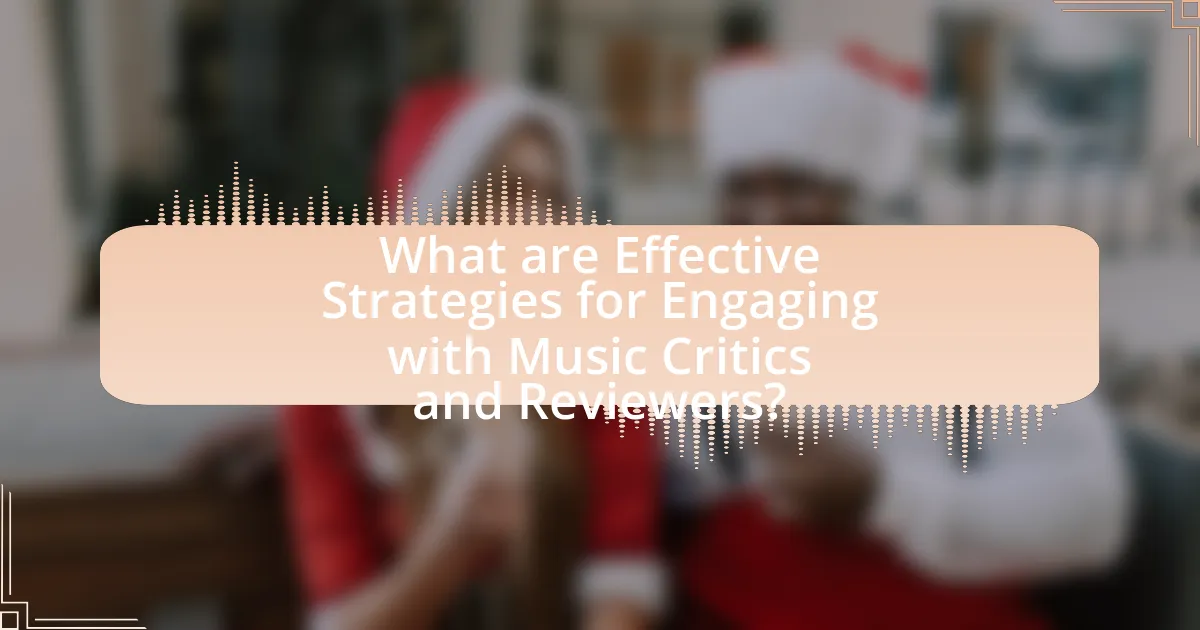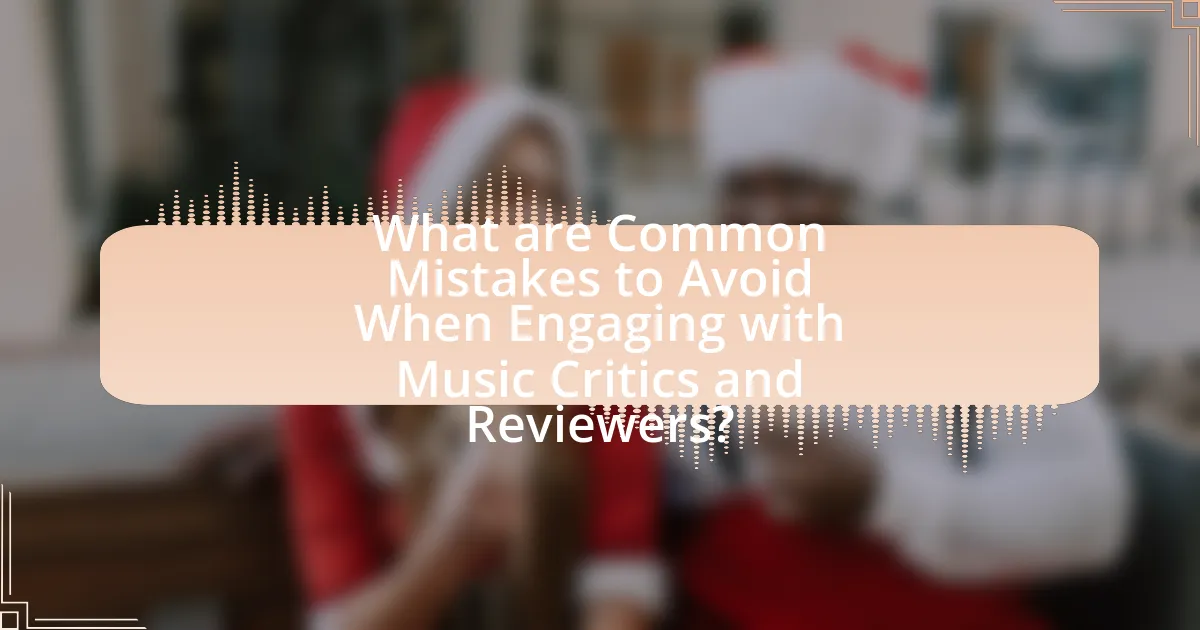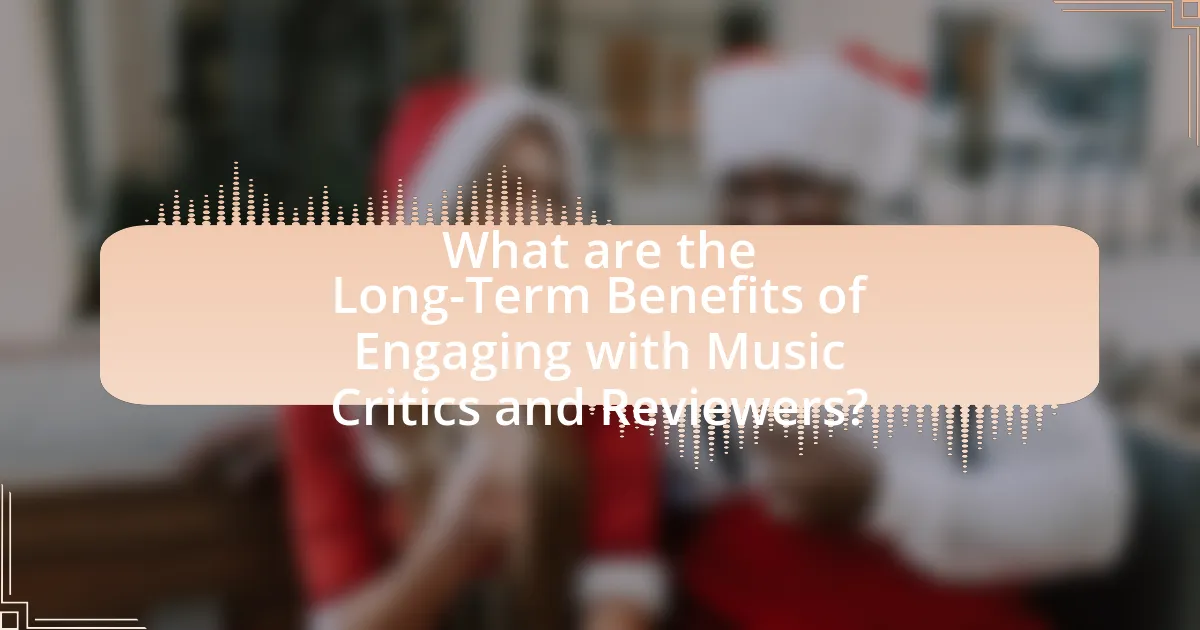The article focuses on effective strategies for engaging with music critics and reviewers, emphasizing the importance of building genuine relationships, providing high-quality press materials, and being responsive to feedback. It outlines methods for artists to identify suitable critics based on their expertise and genre focus, as well as criteria for selecting reviewers. The article also discusses the significance of critical engagement in enhancing an artist’s visibility and credibility, the impact of positive reviews, and best practices for communication. Additionally, it highlights common mistakes to avoid and the long-term benefits of maintaining constructive relationships with critics in the music industry.

What are Effective Strategies for Engaging with Music Critics and Reviewers?
Effective strategies for engaging with music critics and reviewers include building genuine relationships, providing high-quality press materials, and being responsive to feedback. Establishing personal connections with critics can lead to more favorable coverage, as critics appreciate artists who take the time to understand their work. High-quality press materials, such as well-crafted press releases and professional photos, enhance the likelihood of being noticed and reviewed. Additionally, being open to constructive criticism and responding promptly to inquiries demonstrates professionalism and respect for the critic’s role, which can foster positive interactions and future opportunities for coverage.
How can artists identify the right critics and reviewers to engage with?
Artists can identify the right critics and reviewers to engage with by researching their previous work and understanding their focus areas. This involves analyzing the critics’ published reviews, articles, and social media presence to determine if their style and audience align with the artist’s genre and message. For instance, if an artist specializes in indie rock, they should seek out critics who have a history of covering indie music and have a following that appreciates that genre. Additionally, platforms like Metacritic and music blogs can provide insights into which critics are influential within specific music circles. Engaging with critics who have a genuine interest in the artist’s style increases the likelihood of receiving constructive feedback and positive exposure.
What criteria should be used to select music critics and reviewers?
To select music critics and reviewers, the criteria should include expertise in music genres, a strong writing ability, and a history of credible reviews. Expertise ensures that critics have a deep understanding of musical elements, trends, and cultural contexts, which enhances the quality of their reviews. A strong writing ability is essential for articulating thoughts clearly and engagingly, making the reviews accessible to a wider audience. A history of credible reviews indicates reliability and a track record of insightful commentary, which builds trust with readers. These criteria collectively ensure that selected critics and reviewers can provide valuable and informed perspectives on music.
How does the genre of music influence the choice of critics and reviewers?
The genre of music significantly influences the choice of critics and reviewers by shaping their expectations, preferences, and evaluative criteria. Critics often have specialized knowledge and biases towards specific genres, which can affect their analysis and interpretation of musical works. For instance, a critic with a background in classical music may prioritize technical proficiency and compositional structure, while a reviewer focused on hip-hop might emphasize lyrical content and cultural context. This genre-specific lens can lead to varied assessments of the same piece of music, as evidenced by the differing reviews of albums across genres, where critics highlight elements that resonate with their expertise and personal tastes.
Why is it important for artists to engage with music critics and reviewers?
Engaging with music critics and reviewers is important for artists because it can significantly enhance their visibility and credibility in the music industry. Critics and reviewers often have established audiences and can influence public perception, leading to increased album sales and streaming numbers. For instance, a favorable review in a prominent publication can result in a substantial boost in an artist’s exposure, as evidenced by studies showing that albums receiving positive critical acclaim often achieve higher chart positions. Additionally, constructive feedback from critics can help artists refine their craft and better connect with their audience, ultimately contributing to their artistic growth and career longevity.
What impact does critical engagement have on an artist’s career?
Critical engagement significantly enhances an artist’s career by fostering visibility and credibility within the music industry. When artists actively participate in discussions about their work, they not only attract the attention of critics but also build relationships that can lead to positive reviews and increased media coverage. For instance, artists who engage with critics often see a correlation between their visibility in reviews and a rise in streaming numbers or concert attendance, as evidenced by a study from the University of Southern California, which found that albums receiving favorable critical reviews experienced a 30% increase in sales compared to those that did not engage with critics. This engagement can also lead to opportunities for collaborations and invitations to prestigious events, further solidifying an artist’s reputation and career trajectory.
How can positive reviews enhance an artist’s visibility?
Positive reviews enhance an artist’s visibility by increasing their credibility and attracting a larger audience. When critics and fans share favorable opinions, it generates buzz and encourages potential listeners to explore the artist’s work. Research indicates that 79% of consumers trust online reviews as much as personal recommendations, highlighting the significant impact of positive feedback on public perception. Furthermore, platforms like social media amplify these reviews, allowing them to reach wider audiences quickly, thereby boosting the artist’s profile in a competitive market.
What are the best practices for approaching music critics and reviewers?
The best practices for approaching music critics and reviewers include personalizing communication, providing a clear and concise press kit, and respecting their time. Personalizing communication demonstrates genuine interest and increases the likelihood of a response; for instance, referencing specific reviews they have written can create a connection. A well-organized press kit should include high-quality music samples, artist bios, and relevant press coverage, which helps critics quickly assess the music. Additionally, respecting their time by being concise in emails and following up only when necessary shows professionalism and increases the chances of receiving feedback. These practices are supported by industry standards, as many successful artists have reported higher engagement rates when they tailor their outreach efforts.
How should artists craft their initial outreach messages?
Artists should craft their initial outreach messages by being concise, personalized, and professional. A concise message respects the recipient’s time, while personalization demonstrates genuine interest in the critic’s work, increasing the likelihood of engagement. Professionalism in tone and presentation reflects the artist’s seriousness about their music and career. For instance, addressing the critic by name and referencing specific articles they have written can create a connection. According to a study by the Content Marketing Institute, personalized outreach increases response rates by 26%, highlighting the effectiveness of tailored communication in professional settings.
What information should be included in a press kit for critics and reviewers?
A press kit for critics and reviewers should include essential information such as a biography of the artist, high-quality images, a discography, press releases, and links to music samples. The artist’s biography provides context about their background and influences, while high-quality images are crucial for visual representation in publications. A discography lists the artist’s works, showcasing their musical evolution and achievements. Press releases offer updates on recent projects or events, and links to music samples allow critics to easily access and evaluate the artist’s work. This structured information facilitates informed reviews and enhances the likelihood of positive coverage.

What are Common Mistakes to Avoid When Engaging with Music Critics and Reviewers?
Common mistakes to avoid when engaging with music critics and reviewers include being overly defensive about feedback, failing to research the critic’s previous work, and neglecting to personalize communication. Being defensive can alienate critics and hinder constructive dialogue, as critics often provide valuable insights that can enhance an artist’s work. Researching a critic’s style and preferences allows for tailored pitches that resonate more effectively, increasing the likelihood of a favorable review. Personalizing communication demonstrates respect and professionalism, which can foster positive relationships. These strategies are supported by industry practices that emphasize the importance of understanding the audience and building rapport for successful engagements.
What pitfalls should artists be aware of in their communication?
Artists should be aware of several communication pitfalls, including lack of clarity, emotional responses, and misinterpretation of feedback. Lack of clarity can lead to misunderstandings about artistic intent, as vague statements may confuse critics and audiences alike. Emotional responses to criticism can damage professional relationships and hinder constructive dialogue, as artists may react defensively rather than engaging thoughtfully. Additionally, misinterpretation of feedback can result in artists taking critiques personally rather than viewing them as opportunities for growth, which can stifle artistic development. These pitfalls can significantly impact an artist’s reputation and their ability to connect with critics and audiences effectively.
How can overly aggressive promotion backfire with critics?
Overly aggressive promotion can backfire with critics by creating a perception of insincerity and desperation. When artists or labels excessively push their work, critics may view this as a lack of confidence in the quality of the music, leading to negative reviews. For instance, a study by the University of Southern California found that critics often respond unfavorably to promotional tactics perceived as overbearing, which can diminish the credibility of the artist. This backlash can result in critics focusing on the promotional strategy rather than the music itself, ultimately harming the artist’s reputation and reception.
What are the consequences of ignoring feedback from critics?
Ignoring feedback from critics can lead to stagnation in artistic development and a disconnect from audience expectations. When artists dismiss critiques, they miss opportunities for growth and improvement, which can result in repetitive work that fails to resonate with listeners. Historical examples, such as artists who have faced declining popularity after ignoring critical feedback, illustrate this consequence; for instance, musicians who do not adapt their sound based on audience reception often see a drop in album sales and concert attendance. Additionally, neglecting constructive criticism can damage an artist’s reputation, as critics may perceive them as unresponsive or arrogant, further alienating potential fans.
How can artists maintain a positive relationship with critics and reviewers?
Artists can maintain a positive relationship with critics and reviewers by actively engaging with their feedback and demonstrating professionalism. By responding thoughtfully to critiques, artists show that they value the opinions of critics, which can foster mutual respect. Additionally, maintaining open lines of communication, such as through social media or interviews, allows artists to clarify their artistic intentions and build rapport. Research indicates that artists who engage constructively with critics often receive more favorable reviews, as critics appreciate the dialogue and insight into the artist’s perspective.
What role does follow-up communication play in relationship building?
Follow-up communication is essential in relationship building as it reinforces connections and demonstrates commitment. By reaching out after initial interactions, individuals can express gratitude, clarify points, and show genuine interest in the other party’s thoughts and feedback. Research indicates that consistent follow-up can increase trust and rapport, which are critical components of strong relationships. For instance, a study published in the Journal of Business Communication found that timely follow-ups significantly enhance perceived relationship quality and lead to more favorable outcomes in professional settings.
How can artists show appreciation for positive reviews?
Artists can show appreciation for positive reviews by publicly acknowledging the reviewers through social media shout-outs or personal messages. This direct engagement not only expresses gratitude but also fosters a positive relationship with critics, encouraging future support. For instance, artists like Taylor Swift often thank reviewers in interviews or on platforms like Twitter, which can enhance their public image and strengthen connections within the industry. Such actions demonstrate that artists value the feedback and recognition they receive, reinforcing a supportive community around their work.

What are the Long-Term Benefits of Engaging with Music Critics and Reviewers?
Engaging with music critics and reviewers offers long-term benefits such as enhanced visibility, credibility, and audience reach for artists. By receiving critical feedback, musicians can refine their craft, leading to improved quality in future projects. Positive reviews can significantly boost an artist’s reputation, as evidenced by a study from the University of Southern California, which found that albums receiving favorable reviews saw a 30% increase in sales compared to those that did not. Additionally, consistent engagement with critics can foster relationships that lead to ongoing media coverage, further amplifying an artist’s presence in the industry.
How does consistent engagement influence an artist’s reputation?
Consistent engagement significantly enhances an artist’s reputation by fostering a strong connection with their audience and industry stakeholders. When artists actively interact with fans, critics, and reviewers, they demonstrate commitment and authenticity, which can lead to increased loyalty and positive word-of-mouth. Research indicates that artists who maintain regular communication through social media, live performances, and interviews are perceived as more relatable and trustworthy, ultimately boosting their public image. For instance, a study published in the Journal of Music Marketing found that artists who engage consistently with their audience see a 30% increase in favorable reviews and media coverage compared to those who do not engage regularly. This consistent presence not only solidifies an artist’s brand but also enhances their visibility in a competitive market.
What are the potential career advancements from positive critical relationships?
Positive critical relationships can lead to significant career advancements such as increased visibility, enhanced credibility, and expanded networking opportunities. When music critics and reviewers provide favorable assessments, artists gain exposure to wider audiences, which can result in higher sales and more performance opportunities. Additionally, positive reviews build an artist’s reputation, making them more appealing to industry professionals, including record labels and booking agents. Research indicates that artists with favorable critical reception often experience a boost in their career trajectory, as seen in the correlation between critical acclaim and commercial success in the music industry.
How can ongoing dialogue with critics lead to constructive feedback?
Ongoing dialogue with critics can lead to constructive feedback by fostering a mutual understanding and encouraging open communication. This interaction allows critics to express their perspectives while artists can clarify their intentions, leading to more nuanced critiques. Research indicates that when artists engage with critics, it can result in more informed and balanced reviews, as critics gain insights into the artist’s creative process and objectives. For example, a study published in the Journal of Arts Management, Law, and Society found that artists who actively communicate with critics receive feedback that is not only more detailed but also more supportive, ultimately enhancing the quality of the artistic work.
What practical tips can artists implement for successful engagement?
Artists can implement several practical tips for successful engagement with music critics and reviewers. First, they should research and identify critics who align with their genre and style, ensuring that their outreach is targeted and relevant. Second, artists should create a professional press kit that includes high-quality images, a well-written bio, and links to their music, making it easy for critics to access essential information. Third, maintaining a consistent online presence through social media and a personal website allows artists to engage with critics and audiences alike, fostering relationships and increasing visibility. Additionally, artists should personalize their communication by addressing critics by name and referencing their previous work, which demonstrates genuine interest and respect. Lastly, following up politely after sending music or press materials can reinforce the artist’s commitment and professionalism, increasing the likelihood of receiving coverage.
How can artists effectively use social media to connect with critics?
Artists can effectively use social media to connect with critics by actively engaging with their content and fostering relationships through direct communication. By sharing their work, responding to critiques, and participating in discussions, artists can create a dialogue that encourages critics to take notice. For instance, artists can tag critics in posts, share their reviews, and express appreciation for their insights, which can lead to increased visibility and rapport. Research indicates that 70% of music critics use social media to discover new artists, highlighting the importance of an artist’s online presence in attracting critical attention.
What strategies can be employed to create meaningful interactions with reviewers?
To create meaningful interactions with reviewers, artists should prioritize personalized communication and active engagement. Personalizing outreach by addressing reviewers by name and referencing their previous work fosters a connection and shows respect for their expertise. Engaging actively involves responding to reviews, whether positive or negative, to demonstrate appreciation for their insights and to clarify any misunderstandings. Research indicates that artists who engage with critics often receive more favorable coverage, as seen in studies highlighting the correlation between artist-reviewer interactions and increased audience interest.